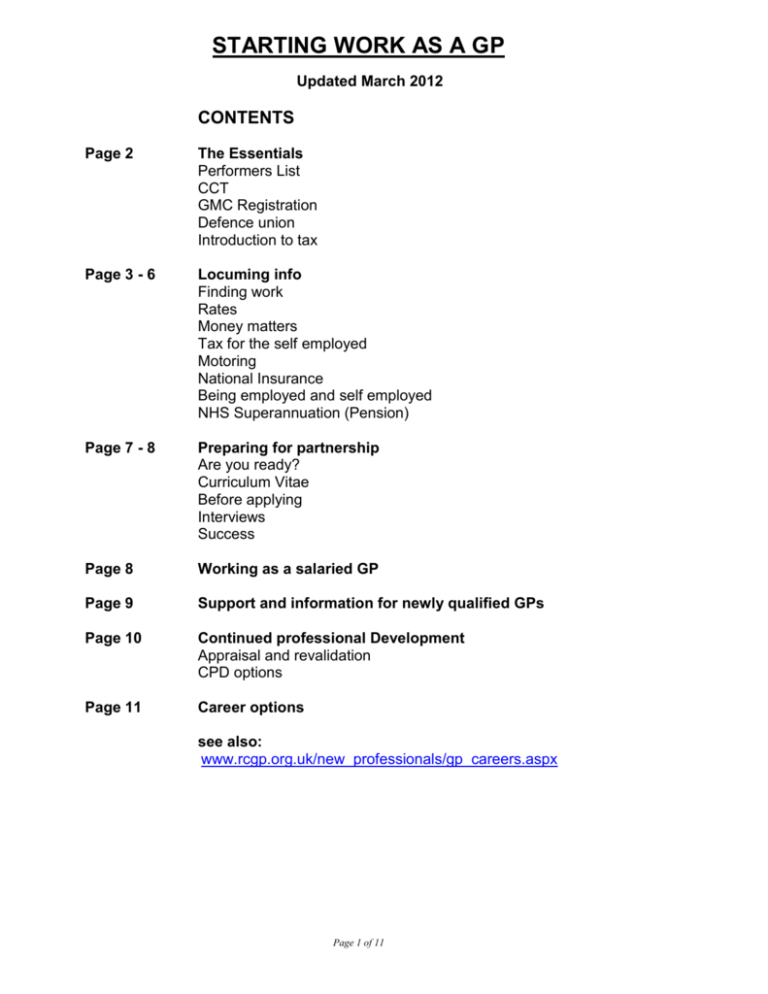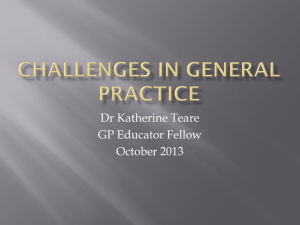Starting Work as a GP
advertisement

STARTING WORK AS A GP Updated March 2012 CONTENTS Page 2 The Essentials Performers List CCT GMC Registration Defence union Introduction to tax Page 3 - 6 Locuming info Finding work Rates Money matters Tax for the self employed Motoring National Insurance Being employed and self employed NHS Superannuation (Pension) Page 7 - 8 Preparing for partnership Are you ready? Curriculum Vitae Before applying Interviews Success Page 8 Working as a salaried GP Page 9 Support and information for newly qualified GPs Page 10 Continued professional Development Appraisal and revalidation CPD options Page 11 Career options see also: www.rcgp.org.uk/new_professionals/gp_careers.aspx Page 1 of 11 ESSENTIALS 1. Apply for CCT & GMC GP Register. On your eportfolio ‘Accept’ your final ARCP report as soon as it is available. Then click on 'Apply for a CCT' button once. This will send your application for a CCT to the RCGP Certification Unit. Make sure you also complete the GMC online CCT application form. The details of this will have been sent to you by the RCGP Certification Unit in your final 6 months of training. The Certification Unit will take 15 working days to process your CCT application and forward a recommendation to GMC. The GMC will take up to 10 working days to issue your CCT http://www.rcgp.org.uk/gp_training/certification.aspx http://www.gmc-uk.org/doctors/applications.asp) This will cost around £800 . You are not eligible to work or earn without this. 2. Apply to join the Performers List. You must be registered with your local Health Board before being allowed to work as a GP. Apply to the area where you are based/will do most of your work. You will need to apply to different lists if you want to work in England, N. Ireland or Wales Health Boards in the West of Scotland are: Greater Glasgow and Clyde (kate.mcgloan@ggc.scot.nhs.uk) Ayrshire and Arran (Jacqui.mccall2@aapct.scot.nhs.uk) Lanarkshire (Gillian.forsyth@lanarkshire.scot.nhs.uk) Forth Valley (Jacqueline.lennox@nhs.net) Dumfries and Galloway (shiona.burns@nhs.net) For background information (written for an English audience) see www.nasgp.org.uk/lists/performers_lists_faq_doh.pdf 3. Appropriate membership level of Defence union around £2-3,000. Cost depends on average number of clinical sessions worked per week. 4. If you are working as a locum; register as Self-employed for tax and national insurance - go to http://www.hmrc.gov.uk/selfemployed/index.shtml or phone 0845 915 4515 Page 2 of 11 LOCUM WORK http://www.rcgp.org.uk/pdf/MI_ADVICE_PACK_FOR_LOCUMS.pdf GP Locums – Getting it Right – Things you need to know http://careers.bmj.com/careers/advice/view-article.html?id=829 Getting Work www.locum123.com You can enter the areas and types of work you are looking for. You will then receive a text or email letting you know if someone is looking for a locum. You can also buy a copy of the ‘Locum Doctor Survival Guide’ here. Glasgow Locum Group Word of mouth, reputation, contact local practices. Let your friends/colleagues know if you are looking for work and if you’d like them to give your contact details to practices that are looking for cover. Think about sending you CV to practice managers in the areas you wish to work. Agencies – Back of BMJ, GP ‘Comics’ or google search Out of Hours GP services for all local Health Boards http://www.glasgowlocumgroup.org Greater Glasgow and Clyde Ayrshire and Arran Lanarkshire Forth Valley Dumfries and Galloway (jim.marshall@ggc.scot.nhs.uk) (nicola.montgomery@aapct.scot.nhs.uk) (marion.macdonald@lanarkshire.scot.nhs.uk) (linda.davidson2@nhs.net) Think laterally. If you’d like to do some non-GP work, make enquiries in the relevant specialty. Often hospitial specialties e.g A&E are keen to employ GPs. Rates LOCUMS ARE NOT ALLOWED TO AGREE WITH EACH OTHER TO FIX RATES as this can be seen by the Office of Fair Trading as operating a cartel, which can land you with a hefty fine. However, by asking around locums and practices, you should get an idea of the current local variations for different types of work. It’s a free market so at the end of the day it’s a negotiation between you and the practice based on how much you are willing to work for, and how much they are willing to pay. Supply and demand forces will influence this as well as individual circumstances For further guidance and locum FAQs see http://www.bma.org.uk/employmentandcontracts/employmentcontracts/sessional_gps/in dex.jsp Page 3 of 11 Money matters If you work as a locum you will be self-employed and responsible for an annual tax return. You will need a system to keep track of where & when you have worked, invoices, and checking that you have been paid. Learning how to use an Excel spreadsheet is quite handy for this. You will probably need to put aside a significant sum of money each month to cover your tax (20-40%), superannuation (pension) (5 – 7.5%) and national insurance (9%) – about 35% of your income up until about £37,000 annual earnings and about 50% of your income after that. Tax for the Self -Employed This is by no means definitive - see www.hmrc.gov.uk for a host of information including self assessment tax returns, allowable expenses, self-employed advice and motoring advice (purple box.. ‘individuals and employed’… ‘self employed’). Most Locums use an accountant! As of 2012 the first £8,105 of your earnings are tax free. After that earnings up to £34,370 are taxed at 20%. Earnings above £34,371 are taxed at 40% (and if you are planning to work 365 days a year or have other money making schemes up your sleeve……earnings above £150,000 are taxed at 50%). These figures may change depending on government policy. You need to file your tax return by 31 January for the previous financial year. Eg 31 Jan 2013 for the tax year April 6 2011 to April 5 2012. Some points: By law you must maintain "adequate records" and keep them for 6 years Your work related expenses all become tax deductible. This can include subsistence and accommodation whilst working away from your base. GMC, Defence, BMA, RCGP, Motoring, Medical Equipment and Supplies, Computers, Office expenses, are all deductible, as are ‘Premises’ costs (e.g. a proportion of your rent/mortgage/utility bills – but that may affect the capital gains status of your house, if you own it) Most of these expenses are directly offset against your profit for the year, but certain assets like a new car or computer are subject to ‘writing down’ as a ‘capital allowance’ as they depreciate in value. ie – you can claim tax relief on a proportion of the value of the item per year. If you use these items for personal use, you will need to make proportional adjustments too. Currently, writing down is set at 20% per year for cars (but 100% if low CO2 emissions), 40% for computer in the first year and then 25% of its remaining value per year after that. This is probably where an accountant is needed! Page 4 of 11 Motoring As a locum, your home address will usually be regarded as your business address. This means that you may claim work-related mileage from home to any practice in which you work, as well as mileage related to the locum work itself. Remember that Car Tax, Insurance, MOT, Servicing, Repair costs, etc. are all deductible. Keep a log – “I keep a note of my mileage at the start of the tax year and record only locum mileage. I can then calculate the proportion of work/personal. So if 82% of my mileage is due to work, I simply claim 82% of all my motoring expenses for that year”. You do need to keep all your receipts. By now you will see that a computer is a very good idea! Entering each receipt into a spreadsheet or financial program (eg. Quicken) as you go saves literally days when doing your tax return. If you don’t want to record all your motoring expenses, the Inland Revenue will accept a flat rate depending on your mileage and size of car – e.g. 40p per mile. National Insurance (NI) As a Locum, you are liable for both Class 2 and Class 4 NI contributions. Class 2 is a fixed amount of currently about £10 per month, usually paid by direct debit. Class 4 is 9% of your profit (after expenses) between £7,225 and £42 475, and 2% of any earnings after that. This will be calculated as part of your tax return. Being Employed AND Self-Employed Some of you may find yourself in the situation of being employed part-time (eg salaried or fellowship) and also work self-employed (eg as a locum). Your tax return at the end of the year will take into account all your employed earnings and tax paid. (Using your P60 issued by your employer with your April payslip.) However the tax return doesn’t allow for the national insurance you have paid in your employed post (Class 1). So you will find yourself paying NI as part of your employment, and also on all your self-employed earnings. If your total earnings are over £42,475 per year then you will likely have overpaid NI (at 7% - ie £700 overpaid if you earn £53, 000). Contact the NI office in Newcastle on 0845 302 1479 to claim this back or ask for an exemption certificate depending on your circumstances. Page 5 of 11 NHS Superannuation (Pension) If you wish to contribute to the scheme (recommended), you will have indicated this when applying for your performers list. This link will take you to the page with the GP locum superannuation forms A & B and support notes (You have to scroll down quite a bit to ‘GP Locum forms’) http://www.sppa.gov.uk/nhs/forms.htm There are three different ways of paying your pension contributions! 1. Day-Time Locum Work Ask each practice you work for to complete ‘Locum Form A’. At the end of the month collect all your form As together and calculate your superannuation contribution onto Form B. Depending on your annual income this will be 5-7.5% - see below 2. Employed work Your pension contributions are deducted from your pay at source (Pay as You Earn – PAYE). This happens for some OOH work where the Health Board is deducting tax, NI and pension contributions automatically. Check your payslip to make sure the correct deductions are being made (see additional notes below). 3. OOH Work Paid ‘Gross’ You have to pay 5-7.5% AND your employers contribution of 13.5% ! (You may be able to invoice the practice/health board to claim back the 13.5%) Complete a Form A. Submit a different Form B from your day-time Form B and mark the form ‘OOH’. There are complicated sums on the form to take account of the employers contribution. Before the 7th of the month, send all your Form As and one/two Form Bs for the month, together with a different cheque for each Form B to Practitioner Services of the Health Board whose performers list you are on. The next link will take you to the SPPA circular explaining the new tiering levels. The Health Boards may automatically deduct pension contributions at 7.5% for OOH work but this is incorrect if your income is less than £69,931. Fill in the Appendix at the end of the circular and if in doubt, contact SPPA for advice. http://www.sppa.gov.uk/nhs/documents/NHSCircular20106revisedtieredconsfinal_000.pdf Page 6 of 11 PREPARING FOR PARTNERSHIP ‘Becoming a partner’ by Dr David Wrigley http://careers.bmj.com/careers/advice/view-article.html?id=1293 Are you ready for partnership? Some GPs enter partnership immediately after completing training, some prefer to get experience as a locum or salaried GP first, and some GPs choose not to enter partnership. There is no right answer to this question and its worth thinking through what your priorities are. Curriculum Vitae Possible CV headings Education Post graduate qualifications and exams Previous employment Special interests and skills Audit and publications Courses Other interests Referees Tip: personalise your cover letter to the practice you’re applying to – practices don’t want a generic letter, they want to know why you want a job in their particular practice. Don’t forget to spell check – lots of spelling errors doesn’t look professional Before applying Find out about the practice from others – shouldn’t be hard, the world of General Practice is small. Think about the practice demographics – do you want to work in a large or small practice, urban or rural? Interviews You are interviewing them as much as they are interviewing you so don’t be afraid to ask about:1. 2. 3. 4. 5. 6. 7. Money? Years to full parity? Do I need to buy in? Does this include premises? What is the practice vision for the next 5 years? Do you all get on? How do you resolve conflict? What is work-life balance like? Is there a partnership agreement? Practice interviewing with a friend/colleague before the big day. Do a practice visit before the interview – shows an element of interest and allows you to get a feel for the place. Page 7 of 11 Be yourself at the interview – say what you really think, not what you think the interviewers want to hear. Ask what the practice are looking for – any specific skills/interests or are they more interested in finding someone that will fit in ie. will you get on, can you work together, what will you bring? Think about what your preferred team role is e.g. use of Belbin Psychologically prepare yourself for a big interview panel – at a minimum its likely to be all the partners plus practice manager. Success? If you are interviewed and offered the partnership, ask for copies of the last 3 years accounts so that you can have them checked by an independent accountant – you want to know what you are buying into. Get a partnership agreement – and get it checked by the BMA 0300 123 1233 www.bma.org.uk/sc/employmentandcontracts/independent_contractors Partnership agreements on the left hand side WORKING AS A SALARIED GP For the bma salaried gps handbook and model contract (lower down the page) go to: www.bma.org.uk/sc/employmentandcontracts/employmentcontracts/sessional_gps THE GP RETAINER SCHEME This scheme supports GPs wishing to work part-time who are unable to commit to substantive General Practice usually due to child care commitments. Retainers can work a maximum of 14 hours per week in GP (4 x 3.5 hrs) and cannot undertake locum work although can work up to 2 non GMS sessions per week with the approval of the Retainer scheme adviser. Potential applicants need to demonstrate a need for additional educational support to be eligible for the scheme. The practice is reimbursed part of your pay. You receive protected educational time and support. The retainer model contract is also on the web page above. ‘Working as a GP retainer’ by Dr Claire Wedderburn http://careers.bmj.com/careers/advice/view-article.html?id=2998 http://www.nes.scot.nhs.uk/education-and-training/by-discipline/medicine/generalpractice/gp-retainer-scheme.aspx West of Scotland Associate Advisor Dr. Alison Garvie Page 8 of 11 alison.garvie@nes.scot.nhs.uk SUPPORT & INFORMATION for NEWLY QUALIFIED GPs www.nasgp.org.uk National Association of Sessional GPs www.doctors.net.uk West of Scotland faculty of RCGP. The faculty provides representation on local and national committees as well as organising local educational and social events. The RCGP has also launched an initiative called “First5” which aims to support new GPs from the completion of training to the first point of revalidation at 5 years. http://careers.bmj.com is a very useful source of information including vacancies, careers articles and course reviews. You can set a weekly alert to send you an email about jobs in areas you are interested in. There is an excellent careers guidance package at http://gpct.scottishappraisal.scot.nhs.uk/index.html BNF Your local performers list administrator can send you up to date papercopies of the BNF. At www.bnf.org you can sign up electronic updates The MHRA can send you national drug safety email alerts at http://www.mhra.gov.uk/Safetyinformation/DrugSafetyUpdate/index.htm Many GPs will experience stress or distress at some point in their professional lives. Mental health and addiction problems are common. Try to look after yourself, maintain your support networks, keep a work-life balance. If necessary ask for help sooner rather than later. Health professionals can self refer to occupational health services. The GPST ‘Important Information pack’ includes a lot of support resources including: BMA Counselling Service and Doctors for Doctors. 08459 200 169 www.bma.org.uk/doctors_health/index.jsp Doctors’ Support Line 0844 395 3010 www.dsn.org.uk info@dsn.org.uk If you are unsure about your chosen career, guidance is available see http://www.nes.scot.nhs.uk/education-and-training/by-discipline/medicine/careersand-recruitment/careers-guidance.aspx Page 9 of 11 CONTINUING PROFESSIONAL DEVELOPMENT Appraisal and revalidation The RCGP intends to introduce a learning credits system as part of revalidation so be prepared to record up to 50 hours of continued professional development per year. See www.rcgp.org.uk/default.aspx?page=7407 for more details. You will still have access to your GPST eportfolio and in the short term it may be worth continuing to use this to record your CPD. The administrator for your performers list can tell you how to ensure you get your annual appraisal. For more details of appraisal, including the appraisal toolkit, visit www.scottishappraisal.scot.nhs.uk This includes a link on the left for sessional gps. This is a helpful page for those GPs who don’t have a base practice to do significant event analyses, audit etc. CPD options You have fantastic access to education as a GPST and after qualification, you can feel suddenly isolated and out of the loop, especially as a locum. Some of your options include: West of Scotland Deaney have excellent CPD activities see http://www.gpcpd.nes.scot.nhs.uk/west-overview.aspx The local Associate Adviser for CPD for sessional GPs is Janice Oliver janice.oliver@nes.scot.nhs.uk Courses/conferences – check out the BMJ and RCGP. If you’re locuming, ask a practice manager if they would be able to forward you emails about local educational events. PBSGL. For more information see www.gpcpd.nes.scot.nhs.uk/pbsgl OOH education – if you are doing OOH, check if there is any educational events organised locally. Practice based – if you work at a practice regularly, ask whether you can join their in-house education or PLT. E-learning. Check out the packages on RCGP, BMJ Learning and doctors.net websites BASICS – Basics Courses are extremely valuable courses, particularly for rural General Practitioners and come highly recommended. For details of courses go to: www.basics.scotland.org.uk Diplomas/MSc – there are an increasing number of options for postgraduate qualifications and there is a huge variation in the amount of work you need to put in and how courses are delivered. See BMJ careers and BJGP University of Glasgow Dept. of General Practice also organise CPD activity. Page 10 of 11 CAREER OPTIONS AFTER GPST – April 2012 Career Option Medical Education Fellowship Remote & Rural Fellowship Academic/ Research Fellowship Formal Contact & Application Info Gen Info 1 year post in either West, SE, East or North, of Scotland. 5 Sessions a week to develop educational skills, experience and Certificate in Medical Education 1 year post eg Argyle & Bute, Arran, , Orkney, Highland, Wigtonshire. 13 Weeks protected educational time. Base practice and mentor, plus time in other remote and rural practices 1 year post based at University Department of General Practice – Aberdeen/Inverness, Dundee, Glasgow, Edinburgh, St Andrews. david.bruce@nes.scot.nhs.uk Feb/March peter.wilkes@virgin.net Feb/March a.hinds@dundee.ac.uk April/May To develop academic interest eg research/education Health Inequalities Fellowship Paediatric Scholarship 1 year, full or half-time. West/East/SE Scotland. Working in area of deprivation plus protected learning time 36 days over one academic year. £10 000 To support GPs to develop a leadership role in child health services in the future Murray.lough@nes.scot.nhs.uk Feb/March ronald.macvicar@nes.scot.nhs a.potter@nhs.net May/June Adapted from a document produced by David Pinney, Katy Wolstencroft, Vicki Guthrie, Rod Sampson. Page 11 of 11




